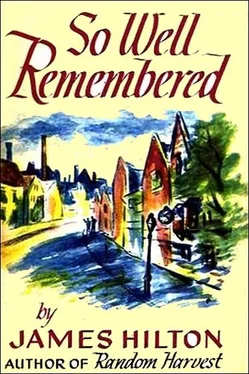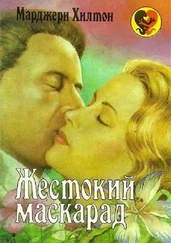Джеймс Хилтон - So Well Remembered
Здесь есть возможность читать онлайн «Джеймс Хилтон - So Well Remembered» весь текст электронной книги совершенно бесплатно (целиком полную версию без сокращений). В некоторых случаях можно слушать аудио, скачать через торрент в формате fb2 и присутствует краткое содержание. Год выпуска: 1945, Жанр: Проза, на английском языке. Описание произведения, (предисловие) а так же отзывы посетителей доступны на портале библиотеки ЛибКат.
- Название:So Well Remembered
- Автор:
- Жанр:
- Год:1945
- ISBN:нет данных
- Рейтинг книги:5 / 5. Голосов: 1
-
Избранное:Добавить в избранное
- Отзывы:
-
Ваша оценка:
- 100
- 1
- 2
- 3
- 4
- 5
So Well Remembered: краткое содержание, описание и аннотация
Предлагаем к чтению аннотацию, описание, краткое содержание или предисловие (зависит от того, что написал сам автор книги «So Well Remembered»). Если вы не нашли необходимую информацию о книге — напишите в комментариях, мы постараемся отыскать её.
So Well Remembered — читать онлайн бесплатно полную книгу (весь текст) целиком
Ниже представлен текст книги, разбитый по страницам. Система сохранения места последней прочитанной страницы, позволяет с удобством читать онлайн бесплатно книгу «So Well Remembered», без необходимости каждый раз заново искать на чём Вы остановились. Поставьте закладку, и сможете в любой момент перейти на страницу, на которой закончили чтение.
Интервал:
Закладка:
Sometimes the cheerfulness sagged a little and George saw the future in a hard bleak flash of momentary disillusionment; but even then he was prone to diagnose his mood as due to overwork, and therefore not to be taken too seriously. The cure was usually a good night’s sleep or a chat with Wendover. The priest’s help was all the more tonic because of the fixity of their disagreements, and also because (as George once laughingly confessed) he was far too modest to suppose that he could exercise any influence in reverse; but Wendover, with equal banter, wouldn’t even concede that this was modesty. “It’s your instinct for self-preservation, George. We authoritarians keep you going. How would you know your opinions were free unless you had ours to attack?… But I’ll suggest this—that before the century ends, it may not be freedom that the world values, so much as order. Order out of chaos. A new world, George, with an old discipline.”
“Aye, but suppose that road leads to Moscow, not to Rome—what would you chaps do then?”
“I should follow my Church, of course. But why assume that the two roads are ultimately so far apart? One thing I DO know—that if the Church so decided, it would be very easy for a Catholic to change his mind about Communism, just as Moscow could doubtless make terms with Rome for as good a reason as Constantine ever had… And what a tremendous bond that is in a chaotic world—two major disciplined forces that know their own power to enforce a decision!”
“You’ve forgotten the Standard Oil Company. That makes three.”
“Let’s say, then, forces that can command not only obedience, but willing sacrifice.”
“Which lets in Hitler. He could command all that at first. But in the end he was defeated by free men.”
“Only when they themselves learned to organize, obey, and sacrifice. And as soon as they forget that lesson there’ll be other Hitlers.”
“Aye, and as soon as we forget we’re free we’ll have Hitlers in our own ranks.”
“There’s danger in whatever we do, George… But don’t misunderstand me… I’m not pleading a cause.”
“Well, I AM—and millions are fighting for it too! Today’s my future—like theirs—and what happens by the end of the century doesn’t give us much comfort—”
“Nor me either. It’s merely that I’m content to let wiser men shape events that can’t yet be properly foreseen. Whereas you have to settle the whole destiny of mankind here and now to satisfy an itching conscience. Quite a handicap!”
“I’d do better if I didn’t think for myself, is that what you mean? Maybe I would—depends on who did the thinking for me. But I want to CHOOSE who… see? And that’s democracy—even for a little fellow.”
“You’re not a little fellow, George. You’re a very shrewd dictator who made up his mind years ago to have his own way in Browdley—and you HAVE had it, against a big majority who’ve been either against your ideas or indifferent to them—and the methods by which you’ve succeeded have been slyness, smartness, blarney, importunity, intrigue, compromise, a certain amount of downright trickery, and a vast amount of personal charm! But you prefer to call it democracy!”
By the time they reached that kind of point in argument George was usually in a good humour and his normal cheerfulness renewed.
He never realized the majestic and in some ways rather terrifying alchemy of English life so much as when he attended official conferences in London. He had been attending them for years, until now they were something rather like routine, but he always remembered his first one—when, as a young man just elected to the Browdley Council, he had been sent as its delegate to a consultation with high officials of one of the Whitehall ministries. Because the Government in power was of the opposite political party to his own he had expected to be frostily received and was full of carefully rehearsed truculence that evaporated at the first calm, polite, and curiously impersonal meeting with people whom he had thought of as his enemies. But it had left him baffled afterwards. “Talk about raising the standard of revolution!” he had reported, when he got back to Browdley. “It was hard enough to make anyone raise a couple of eyebrows!” Was it possible that London did not know what a potentially dangerous man he was? Or did not care? Or both knew and cared, yet was imbued with some classic spirit that would only return cool civility for warm antagonism? After he had attended half a dozen more such conferences, George’s bafflement lessened, not because he had entirely solved the problem, but because he had come to terms with it; it was as peculiar, yet could seem as normal, as the normally peculiar smell of the London tubes.
By now, of course, he was not baffled at all. Whenever he visited the Ministries on business he met important men who knew him, who called him George, who took him to lunch and kidded him good- humouredly about his being teetotal. The war years had only continued, with some intensification, the natural process of all the years; and when, as sometimes happened, George spent half a day at the House of Commons, he found himself surrounded by a platoon of ex-firebrands who held official positions. “Too bad you aren’t here, George,” he had often been told. “You’d have been at least an under-secretary by now.”
“But then I wouldn’t have been Mayor of Browdley,” answered George, seeking to console himself from force of habit, yet no longer really needing to. He liked London; but to be a stranger to it, even a familiar stranger, kept him alive to that same majestic and rather terrifying alchemy of English life, as slow and sure and relentless almost as the grinding of the mills of God.
That it had helped to save England after Dunkirk and during the blitz autumn of 1940, George thought very probable. For then its virtue had shown like good bones under the flesh—especially its abiding combination of firmness and benignity, so that the same machine of government could jail a baronet for a rationing offence and organize the distribution to small children of Mickey Mouse gas- masks. Nothing was too small, and no one too great, to be beyond the range of that cool-headed but never cold-hearted survey. And George, administering Browdley, had tried to generate something of that dual mood in microcosm.
And yet… whenever he went to London he felt the strength of Browdley in him, rebelling against certain things.
One morning, walking briskly along Whitehall after a meeting with officials, George ran into a man named Sprigge whom he had first met years before on the Terrace of the House of Commons. George was pleased to be remembered, and willingly accepted the other’s invitation to have lunch at a near-by club. They talked about the war and politics; Sprigge said that since their previous meeting he had lived a good deal in China and the Malay States, getting out just in time after Pearl Harbour. It was natural then for George to ask, with an air of casualness, if he had ever come across the Winslows.
“You mean Jeff Winslow, brother of Lord Winslow?”
“Aye, that’s him.”
“Knew him well, my dear chap. Often dined at his house. Good parties he used to give—not so starchy as the really official ones, because, as he used to say, he wasn’t really official. You see, he was attached to the Sultan of Somewhere-or-other, and that made a difference. The lady next to you at dinner might be an Italian spy or an Egyptian princess or a Javanese snake-charmer—used to be fun finding out… Was he a friend of yours —Winslow?”
George answered: “Not—er—exactly, but I knew his father slightly—and I’ve also met his son.”
Читать дальшеИнтервал:
Закладка:
Похожие книги на «So Well Remembered»
Представляем Вашему вниманию похожие книги на «So Well Remembered» списком для выбора. Мы отобрали схожую по названию и смыслу литературу в надежде предоставить читателям больше вариантов отыскать новые, интересные, ещё непрочитанные произведения.
Обсуждение, отзывы о книге «So Well Remembered» и просто собственные мнения читателей. Оставьте ваши комментарии, напишите, что Вы думаете о произведении, его смысле или главных героях. Укажите что конкретно понравилось, а что нет, и почему Вы так считаете.










